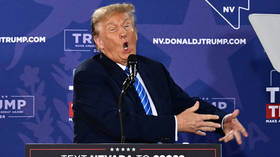
The frontrunner for the US Republican nomination launched a large-scale trade war with Beijing during his presidency

Former US President Donald Trump speaks at a Commit to Caucus Rally in Las Vegas, Nevada, on January 27, 2024. © AFP / Patrick T. Fallon
Former US President Donald Trump has told advisers he wants to impose a 60% tariff on all imports from China if he wins this year’s election, the Washington Post reported on Saturday, citing three unnamed people familiar with the plan.
The measure would trigger major disruptions to the US and to economies around the world, which would far exceed the impact of the trade wars initiated by Trump during his first presidential term, economists for both the Democratic and Republican parties told the newspaper.
During his current presidential campaign, Trump has pledged to revoke China’s status as a “most favored nation” for trade. The designation is applied to almost all nations the US trades with, and the White House can introduce any tariffs on imported goods from countries that do not have it.
According to the GOP front-runner, tariffs on foreign goods raise vital revenue for the US budget, and current import levies are among the world’s lowest.
China is the US’s third largest trading partner after Mexico and Canada. In November, Beijing accounted for 11.7% of total US foreign trade.
READ MORE: Why US-China trade is on track to break records despite all the politics
According to analysts polled by the newspaper, such plans, if executed, are likely to spark a global trade war.
“The 2018 to 2019 trade war was immensely damaging, and this would go so far beyond that it’s hard to even compare to that,” Erica York, senior economist at the Tax Foundation, a right-leaning think tank that opposes the tariffs, told the Washington Post. “This threatens to upend and fragment global trade to an extent we haven’t seen in centuries.”
“If a Trump administration were to put up much higher tariffs on imports from China, American companies would lose most of their market share in both China and many third countries,” Posen said, having called the trade proposals “lunacy.”
For more stories on economy & finance visit RT’s business section




